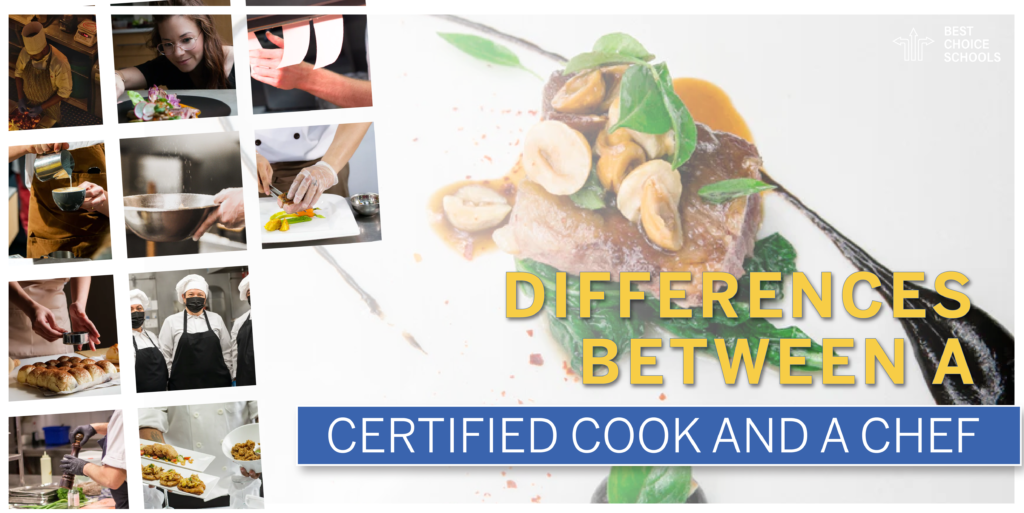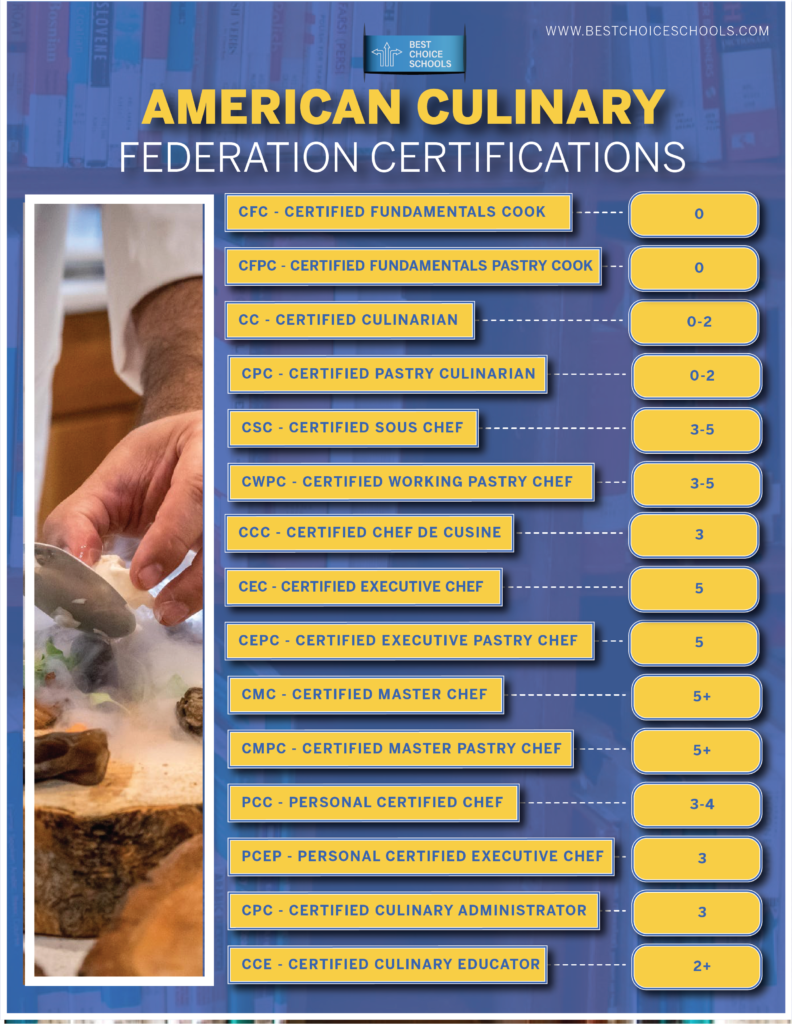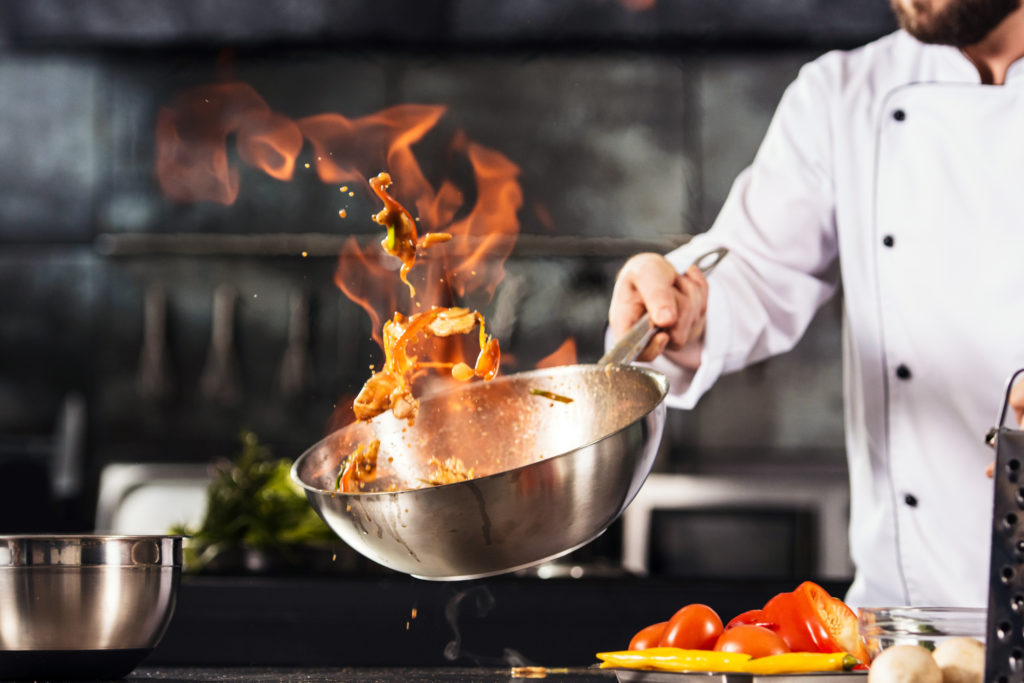
A lot of people use the words’ cook’ and ‘chef’ interchangeably. While the two careers might seem incredibly similar to an untrained person, cooks and chefs actually have quite different roles, lives, and responsibilities. Whether you want to go into the culinary field or not, learning about the differences between cooks and chefs can be valuable information.
The difference between a cook and a chef ultimately comes down to education and experience, although both positions do offer the opportunity for professional certification. A chef is usually considered an individual who is a professional cook that has undergone culinary education or an apprenticeship under another professional chef. Meanwhile, a cook could just be starting out preparing food in an entry-level position at a non-eatery.
Let’s discuss the difference between these two roles and then briefly explore the variety of certifications available to both.
See also: 50 Best Culinary Schools in the US
Table of Contents
Who Decides the Difference Between Cooks and Chefs?
There is no one professional organization that decides who is a chef versus a cook. While most people agree that chefs have more professional skills and typically work in more upscale environments, there is no certification to ‘prove’ you are a chef versus a cook. However, with that being said, pretty much anyone who works as a cook could have the opportunity to become a chef eventually. Additionally, if someone who considers themselves a chef moves to a new job, their title could revert to cook.
Since no specific person or board decides the difference between a cook and a chef, people within the industry most often decide these parameters independently. Restaurants—depending on their individual status—could also change these titles around themselves. For example, you could go to a fancy restaurant and see someone titled a cook and find a chef at a lower-end restaurant.
Definition of Cook vs. Chef
Most people can agree on the fact that a cook seems like a lower-ranking position than a chef. Within the title of chef, there are also different distinctions that one could have. An executive chef will likely be the head person in the kitchen, while someone like a sous chef or chef de partie (line cook) is still working toward becoming the head chef in the kitchen.
A cook is generally thought of as someone who cooks and prepares food, while a chef is typically defined as a professional who is a highly skilled or trained cook working in an upscale hotel or restaurant. Additionally, while a chef typically works in hospitality at an inn, resort, hotel, or restaurant, a cook could work in various places, including sandwich and coffee shops, schools, the military, retirement homes, or even sorority houses.
While it is not entirely necessary to have a degree to become a chef, many chefs do pursue a two or four-year degree at a culinary school or institute. If a chef does not pursue this degree, they may take an apprenticeship underneath a more experienced chef that would equal the education of a two or four-year degree. A chef in a restaurant will likely also have a supervisory role over the other staff members in the kitchen, making sure that all of them are completing their respective duties. An experienced chef—especially a head chef—is also an artist who will often create their own menus and implement new ingredients and techniques into those menus.
A cook will typically not have pursued any degree or professional training to do their job. And a cook will typically not be in charge of the kitchen. Instead, they often report to a head cook or chef and prepare items from a predetermined menu. Thus, a cook can usually expect to:
- Prepare and cook food
- Perform kitchen responsibilities
- Wash dishes and clean up different equipment and areas of the kitchen Follow recipes or a menu plan
- Use their position to learn from a more experienced cook or chef to advance their skills.
Related: 5 Great Apps for Culinary Arts Students

The Roles of Cook and Chef
Although you may find some disagreement on the distinction between the two roles, two words nearly always associated with the title of chef are professional and chief. A chef is generally viewed as a professional cook who is in charge of a hotel or restaurant.
It is not outside the realm of possibility that someone could become the head chef at a restaurant after many years of cooking there. However, in today’s culinary culture, to truly earn the designation, that person also needs to gain skills at culinary school.
Those skills go beyond mere cooking skills, as important as those are. Culinary skills also include managerial skills, which involve issues such as nutrition, meal planning, and restaurant finances.
Suppose your main interest is simply cooking, and you don’t have an interest in a supervisory role over other cooks. In that case, you might not necessarily seek certification as a chef.
However, many people may try to dismiss the role of a cook by claiming that cooks do not work in professional eateries or that they are workers who simply “reheat food.” While this can certainly happen, it is not always the case. In fact, it is opinions like this that have given the title a bad rap. Many cooks do indeed work in restaurants or professional restaurants and eateries.
Cooks need a particular set of skills to effectively prepare, cook, plate, and serve food, even if they are following a meal plan or menu that they did not create themselves. While cooks might not have any significant influence or say in the kitchen regarding things like menu or inventory, they are a vital part of the kitchen staff that should not be discounted just because they may not have professional credentials or a culinary degree.
What’s the Pay Difference Between Cooks and Chefs?
According to Salary.com, the pay range for cooks is between $22,344 to $31,921 a year, and the average base salary for cooks is $26,146. For chefs, the pay range is $39,998 to $61,301 a year, with the base salary being $49,126.
As you can see, the range of compensation is very different between cooks and chefs. Clearly, chefs are considered to have a more professional role than cooks. Therefore, seeing the difference in salary could be a significant deciding factor for you if you are debating whether to pursue a career as a cook or a chef.
Famous Cooks vs. Famous Chefs
You can understand some of the differences between the two roles by observing famous cooks and chefs you’ve probably heard of before. Discussing well-known culinary entities is one area where it becomes more pronounced in how the words cook and chef are somewhat interchangeable.
Rachael Ray is one example. She is one of the most well-known names in the entertainment and culinary industries. However, Ray has never claimed to have professional training as a chef, nor does she consider herself a professional. She doesn’t work at a restaurant; she is simply a celebrity cook and television personality. While she has collaborated with many different restaurants and companies, she does not qualify to be considered a chef according to industry standards.
On the other hand, Gordon Ramsay is an incredibly famous television personality as well, but he is considered a celebrity chef. Ramsay studied hotel management at North Oxfordshire Technical College as a young man and later became a chef at a hotel before rising to fame on television. He has a global chain of restaurants that he manages, and he’s trained many chefs himself both on-screen and off. Ramsay has undergone extensive training and experience to get to the place he’s at in his career, which is why he is considered a chef.
Related: 5 TED Talks for Chefs and Restaurateurs
A Wide Variety of Certifications
Whether you decide to pursue work specifically as a cook or a chef, there are a variety of certifications available which are dependent on specific styles of cooking or particular types of management and supervisory roles. To get a taste of these, you can visit the American Culinary Federation (ACF), which provides details on fourteen different certification levels of culinary skills.
These vary from Certified Culinarian (CC) to Certified Master Chef (CMC) and include pastry chef certifications linked to those trained in baking and pastry skills. Some of the credentials also involve preparation for those who want to become personal chefs or who aspire to become culinary educators.
Most of these certifications include the word chef in their title, except for the Certified Culinarian designation. A certified culinarian is an entry-level designation that seems primarily focused on cooking and not on the supervisory skills included in chef positions. Not all of the chef certifications, however, prepare someone to be entirely in charge. For example, a certified sous chef is usually in charge of a particular cooking station in a restaurant, but not the whole establishment.
Related: 5 Common Courses in Culinary School
The ACF can also certify you as a personal chef, which means you work for a small business, individual, or family. Becoming a Personal Certified Chef (PCC) requires three years of experience as an entry-level culinarian and a minimum of one full year employed as a personal chef. For this experience to count, you will need to sort and prepare the food in addition to cooking it.
American Culinary Federation Certifications

The American Culinary Federation represents the highest standards of professionalism within the culinary field, which is why they are qualified to designate the differences between different culinary roles. The ACF is the largest organization of professional chefs in North America, established in New York City in 1929. The organization comprises more than 17,000 members in 150 different chapters across the USA, and they aim to make a difference in the education, apprenticeship, and careers of chefs around the country.
Related: What are the Requirements to Become a Certified Culinarian?
Becoming A Cook vs. Chef
If you want to work in the culinary industry, you will need to tackle some different things if you’re going to become a cook versus if you want to become a chef. For starters, you should consider how much education and training you want to go through before you can begin working.
If you want to become a chef, you will need to undergo more extended periods of both education and experience before you can start working a chef job on your own. A chef position will likely require you to have a two or four-year degree from a culinary institution, or they will want you to have had a professional apprenticeship under another, more experienced chef. If you do not want to go through this extensive training, perhaps a cook position would be more suited for you to start with.
Depending on where the need is, a position as a cook may be an entry-level role that doesn’t require any outside training. In one of these positions, you will likely start out with chopping and preparing foods, unboxing shipments of food, washing dishes, or acting as an extra set of hands for the other cooks or chefs.
While an entry-level cook role like this will likely pay much less than a professional chef, it is a great place to start if you want to get your foot in the door of the culinary industry. Taking a cooking role can also help you learn from seasoned professionals, giving you experience you can use for the rest of your life.
You may also like: What Should I Look for in a Culinary School?
Closing Thoughts
As you can see, there’s a good deal of complexity involved in the training, roles, and titles available in the culinary world. While it is quite possible that you can become a cook merely through work experience, to be certified as a cook or chef will involve culinary school. Perhaps the best way to learn the differences between a certified cook and a chef may be by talking with those who have culinary education and experience.
You may also enjoy:




